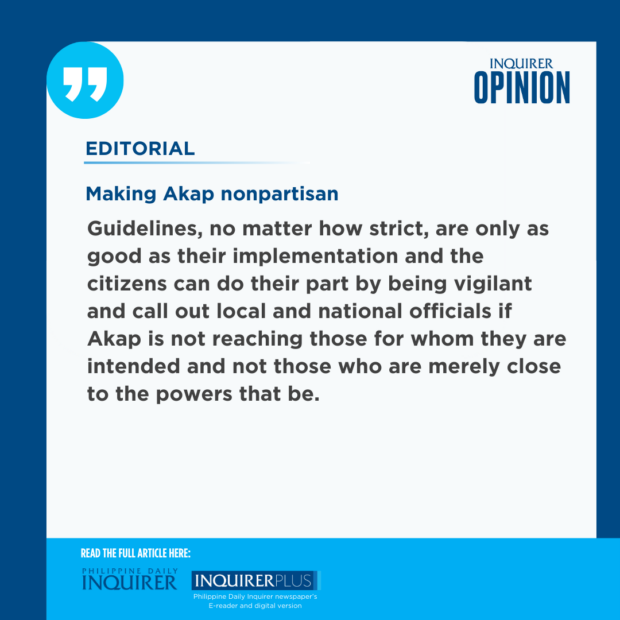Making Akap nonpartisan

President Ferdinand Marcos Jr. expended considerable political capital after he ignored calls to scrap the controversial Ayuda Para sa Kapos ang Kita Program (Akap) and instead injected it with P26 billion in fresh funds under the P6.326-trillion budget for 2025.
He did, however, sought to reassure the public concerned about the funds being used for political gain — especially that 2025 is an election year — by placing the program under “conditional implementation” to “ensure that the people’s funds are utilized in accordance with their authorized and stated purpose.”
The Department of Social Welfare and Development, for instance, will no longer be the sole implementer of Akap.
Instead, the program that was introduced last year to help below-minimum-wage earners cope with elevated inflation will be rolled out this year in coordination with the Department of Labor and Employment and the National Economic and Development Authority (Neda).
“This way, we ensure that its implementation will be strategic, leading to the long-term improvement of the lives of qualified beneficiaries, while guarding against misuse and duplication, and fragmented benefits,” Mr. Marcos explained.
Vote-buying
Social Welfare Secretary Rex Gatchalian already met with Labor Secretary Bienvenido Laguesma and Neda Secretary Arsenio Balisacan to work on the stricter guidelines that will govern the disbursement of the funds to ensure that they will go to the target beneficiaries.
During its first year of implementation, the DSWD said that Akap benefited five million Filipinos.
With the retained funding for this year, five million minimum wage earners and Filipinos living on the poverty threshold are expected to benefit from the Akap, through which they can get a one-time medical, funeral, food, and cash relief of about P5,000 each.
But despite this supposed accomplishment and the repeated assurances from government officials, many Filipinos have remained highly skeptical of the program.
There had been allegations that the Akap funds were being used for vote-buying while critics such as the Taumbayan Ayaw sa Magnanakaw at Abusado Network Alliance (Tama Na) claimed that Akap and similar assistance programs are no different from the pork barrel funds that are used by corrupt politicians to buy votes and influence and make beneficiaries beholden to them.
Multitude of cash aids
It has indeed been difficult to quiet down the widespread criticism, given that Akap was again a last-minute insertion in the 2025 General Appropriations Act, the same way that the program and the P26.7-billion fund for it appeared in the version approved by the bicameral conference committee last year.
Akap had even thumbed down by the Senate at one point citing the multitude of cash aid programs already in place, including the Pantawid Pamilyang Pilipino Program (4Ps), Assistance to Individuals in Crisis Situations, and Tulong Panghanapbuhay sa Ating Disadvantaged/Displaced Workers or Tupad.
But it did decide to eventually restore it in the approved version of the 2025 budget of the bicameral conference committee, albeit with a reduced fund of P26 billion, from the P39.8 billion sought by the House of Representatives.
With Akap staying firmly in place, what the government must demonstrate to assuage the public’s concerns is to adhere to nonpartisan guidelines and to ban politicians from any involvement in the program to show that indeed it will not be used to sway voters to pick administration allies or incumbents in the local government units who will play a big role in distributing the cash aid.
Patronage system
Guidelines, no matter how strict, are only as good as their implementation, and the citizens can do their part by being vigilant and calling out local and national officials if Akap is not reaching those for whom they are intended and not those who are merely close to the powers that be.
But more than these quick fixes, Tama Na said that what Filipinos need more are higher wages and better jobs, not subsidies or dole-outs.
“Very much like the 4Ps program, Akap, and other government sponsored dole-out programs that provide subsidies to alleviate poverty, appear focused on providing necessary relief to struggling families. But in reality, these programs teach dependency rather than empower the people to achieve long-term stability,” the alliance said.
To break free from this patronage system that perpetuates the cycle of control, the government should exert more effort into nurturing an environment where Filipinos will be able to find decent jobs or have adequate livelihood so that they can stand on their own and boost their resilience against storms that will ultimately come their way.
As the alliance underscored, while subsidies may provide temporary relief, they are ultimately no substitute for structural reforms that promote economic justice and prosperity.




















